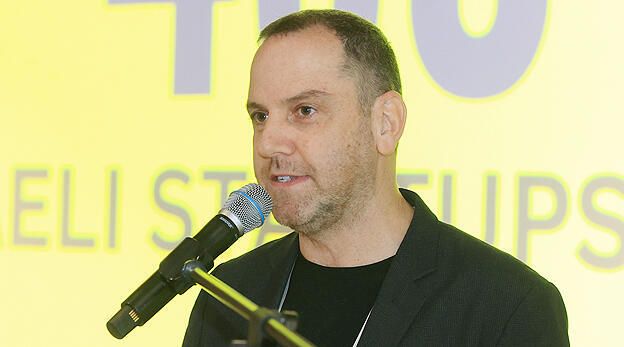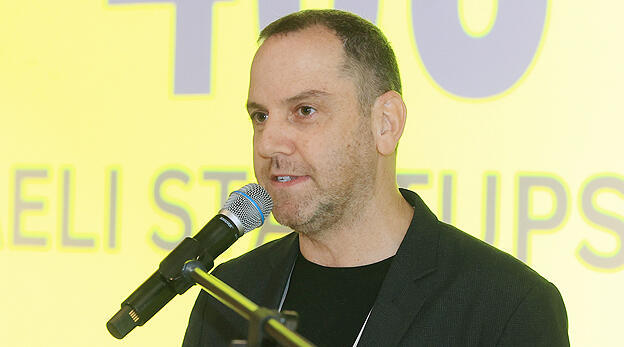
Mind the Tech NY 2024
450 Israeli startups in New York: "The situation in Israel only made us want to invest more there"
According to Guy Franklin, the founder of Israeli Mapped in NY, the number of Israeli startups in the city only increases every year, and many of them took part in Calcalist and Bank Leumi’s Mind the Tech conference in New York. Micah Rosenbloom, managing partner at Founder Collective: "We are focused on investing in companies that effectively manage their capital"; Hadley Harris, founding general partner at ENIAC Ventures: "Companies will experience difficult times in the next two years"
The number of Israeli startups in New York City keeps increasing every year and now stands at about 450 startups founded by Israeli entrepreneurs, it was revealed at the Founders Forum event of Israeli Mapped in NY in collaboration with Valley Bank, LeumiTech and Meitar law firm that was held at the offices of Amazon in New York. The event was held as part of Calcalist and Bank Leumi’s Mind the Tech Conference in New York.
Guy Franklin, founder and general partner at Israeli Mapped in NY, announced at the beginning of the conference that it was great to see so many founders who came to the annual conference in New York: "We are doing this at a challenging time for Israel, but to see so many startups here that were founded by Israelis makes me optimistic. This year we have 450 Israeli startups in New York and the number is only growing - startups that deal with cyber, proptech, AI and more."
Following Franklin, Howard Wright, VP and Global Head of AWS Startups, took the stage. Wright, a former NBA player, told about how he fell in love with Israel when he visited the country to play against Maccabi Tel Aviv: "My son Jordan was named after the Jordan River and not after Michael Jordan," he shared with a half-wink. After him, Maya Eisen Zafrir, CEO of LeumiTech, took the stage, and said, "It is a great honor to be here with you and all our partners. Talking about Israeli high-tech in this period is more important than ever. Meeting and learning from each other is probably the most important thing we can do right now to promote entrepreneurship and our ecosystem forward."
After that, three interviewees from the New York venture capital world took the stage. Grace Isford, a partner at Lux Capital, came up first and said that the fund she works for invests in pioneering technology and deep-tech, and in the connection between science and technology: "We usually say that we are not afraid to aim for the moon and take technical risks, and this is better than taking risks related to the market. We invest in very early stages in these fields. Our focus is on computational sciences, artificial intelligence, machine learning, open source, blockchain and technological infrastructure. One of the companies we invested in is Hugging Face." In regards to investments in artificial intelligence, Isford said that one should distinguish between companies that produce infrastructure for artificial intelligence, and those that make applications from the existing technology.
Taking the stage next was Micah Rosenbloom, managing partner at Founder Collective. Rosenbloom shared his personal story: "I started my career on the west coast, I raised too much money and hired all my friends. I learned so much from this failure. Too much money hurt us and made us make too many mistakes. We expanded too fast. Today we are focused on investing in companies that effectively manage their capital."
Rosenbloom referred to the current situation in the market and said that entrepreneurs should get used to the new reality: "For years they told you that you can live in a fifty-room house and now they tell you that you have to settle for six bedrooms." Rosenbloom said that he later founded another venture in the field of dentistry with a friend: "The only thing I knew about dentistry was that I had teeth," he joked. Rosenbloom talked about the diverse portfolio of their investments, which include Israel's Simply and oyster farms in New England.
Last, but not least, Hadley Harris, founding general partner at ENIAC Ventures, took the stage. The interviewer reminded Harris that two years ago he gave a bleak economic forecast and it turned out he was right, and asked him how he explained the past two years. Harris answered that in his opinion, many of the funds raised too quickly, and when the economic slowdown began, then they themselves were unable to raise money, so even though they are "sitting" on a large amount of capital, they do not intend to spend it: "We have always invested at the same rate, even in 2021 and also in 2014. That's how we could continue to be aggressive in the last two years as well." Harris also referred to the Israeli tech market and talked about companies in which he invests: "We had companies we worked with that part of the team was recruited into the IDF reserves. It did not have a negative effect, it only made us want to invest in Israel more. People will experience difficult times in the next two years, and I found that people who have experienced hard and crazy experiences are better founders."
